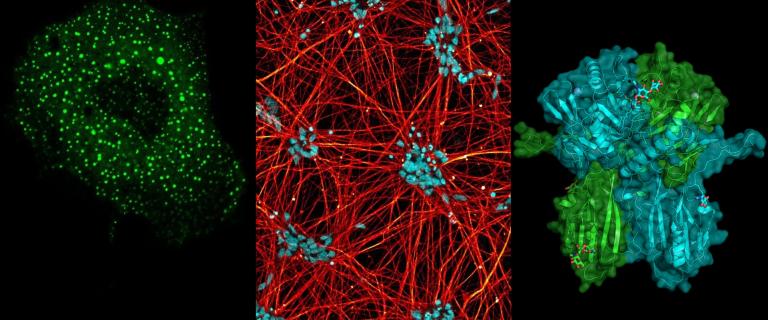
Cambridge Institute for Medical Research (CIMR)
We work to determine the molecular mechanisms of human disease, focusing on genetic and pathogen-induced disruptions to fundamental cellular pathways.
The idea that scientific discoveries are made by a solitary genius working alone in a lab is much more myth than reality. Discoveries come from great teams working in a supportive and positive environment, where everyone’s contributions are valued and celebrated. I’m hugely grateful to everyone who makes CIMR such an extraordinary place to work. - Prof Julian Rayner, CIMR Director
We are an interdisciplinary cross-department research institute.
Our mission is to determine the molecular mechanisms of disease in order to advance human health.
Life on Earth is built on cells, which must organise and maintain themselves to grow and divide - whether they are part of complex multi-cellular organisms such as humans, or single-celled organisms such as the bacteria and parasites that can infect us.
The ability of cells to maintain themselves depends on many thousands of different proteins. All of which must be produced, folded into three-dimensional structures, transported to the location (or organelle) within the cell where they function, and then destroyed when they are no longer required.
Understanding such critical and highly complex biological processes helps us understand how diseases occur. We focus on three specific disease areas:
- rare genetic diseases
- neurological diseases
- those caused when cells are manipulated by intracellular pathogens
We have a large graduate student body, with typically over 40 PhD students and around 15 Masters. Along with the MRC Mitochondrial Biology Unit, we run a taught MPhil course in Molecular Mechanism of Human Disease.
We have an active public engagement programme, focusing on widening participation programmes to actively increase the diversity of the science talent pipeline, and family-friendly events.
Our research themes
Our research themes are:
- rare genetic diseases
- neurological diseases
- intercellular infections
Our department
We currently have 25 research groups:
- Prof Folma Buss
- Prof Janet Deane
- Dr Melissa Gammons
- Dr David Gershlick
- Prof Gillian Griffiths
- Prof Jim Huntington
- Dr Zuzana Kadlecova
- Prof Fiona Karet
- Dr Janin Lautenschläger
- Prof Paul Luzio
- Prof Stefan Marciniak
- Dr Jonathon Nixon-Abell
- Prof David Owen
- Prof Julian Rayner
- Prof Randy J Read
- Prof Evan Reid
- Prof Margaret Robinson
- Prof David Ron
- Prof David Rubinsztein
- Dr Jeanne Salje
- Prof Matthew Seaman
- Dr Symeon Siniossoglou
- Prof Alan J Warren
- Prof Michael Weekes
- Prof Geoff Woods
We are also supported by core facilities teams:
- Microscopy, led by Matthew Gratian
- Flow cytometry, led by Dr Reiner Schulte
- Proteomics, led by Dr Robin Antrobus

Get in touch
Visit us or contact us

Visit us
Cambridge Institute for Medical Research
University of Cambridge
The Keith Peters Building
Cambridge Biomedical Campus
Hills Road
Cambridge
CB2 0XY


